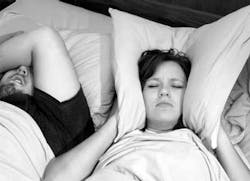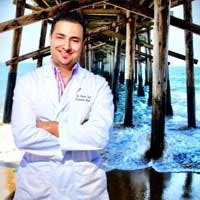Do you ask your dental patients if they snore?
Research into sleep dentistry reveals that snoring is a leading etiology of nighttime bruxism, and a nightguard may not be the only treatment option. In fact, if a patient suffers from severe sleep apnea, a nightguard alone may prevent adequate oxygen from entering the airways and ultimately can become a life-threatening issue. Patients who snore at night do so, in most cases, because they suffer from sleep apnea. Sleep apnea is a condition where not enough oxygen enters the oropharyngeal cavity and ultimately the lungs, due to the displaced position of the mandible or other obstructions in the oral cavity.
When patients snore, there are usually other associated symptoms such as a scalloped tongue, where the tongue has tiny ridges on its tip because it is constantly trying to push the mandible forward. Patients may also have tori, large bony protrusions along the inside walls of the lower palate. These bony protrusions are caused by excessive calcium deposits from constant occlusal trauma — the oral cavity equivalent of bunions. Other glandular anomalies such as large uvula or tonsils can prevent adequate oxygen from entering the lungs and maintaining a healthy breathing pattern.
New science in sleep medicine, sleep dentistry, and TMJ specialties demonstrate that when a patient suffers from sleep apnea, the body will have periods of up to 10 seconds where no oxygen enters the body; the patient will gasp for air multiple times during REM sleep. In fact, the TMJ assists with this process by clenching to wake up the body during these periods of apnea, or lack of oxygen. This constant clenching during the evening is what researchers and sleep lab technicians measure to determine the relationship between bruxism and sleep apnea.
Previously, if we asked patients whether they had any soreness in their TMJ muscles in the morning and they answered yes, the common, standard treatment would be a nightguard. Patients who suffered from a "click" when their jaw opened would be referred to a TMJ specialist to "pop" the jaw back into place. However, these treatment modalities are becoming outdated for patients who suffer from sleep apnea. We need more information to give these patients the best long-term treatment options.
At our practice in Orange County, we ask all of our patients to fill out a questionnaire with simple yes or no questions relating to their sleep habits. If they score a 10 or higher on the questionnaire, we have our local sleep lab send them a pulse oximeter, which measures nocturnal oxygen level. If the pulse-ox reading is below the threshold for adequate oxygen levels, we have the patient participate in a nighttime sleep study. Once patients understand the importance of this study and how sleep apnea can be fatal if left untreated, they are usually more eager to participate. In most cases, the suffering spouse or partner urges them to do something about their snoring. If the sleep study proves that the patient is indeed suffering from severe sleep apnea, he or she is treated with a CPAP machine and then goes under the care of an ENT physician. However, if the patient suffers from moderate sleep apnea, he or she will come back to our dental office to be fitted with a custom sleep appliance.
Patients routinely ask how a custom-fitted sleep appliance is different than a mouthguard, and the answer lies in the position of the mandible. Nightguards are only good for preventing the top teeth from forcefully occluding with the bottom teeth; they don't position the lower jaw forward to allow more air to enter. A custom-fitted sleep appliance is a device that has a top part and a bottom part, locked into place. Its unique placement allows the lower jaw to be moved forward to allow more air to enter the oral cavity. This device prevents the tongue from forcing the jaw forward, avoids scalloping, and ultimately prevents forceful occlusion and TMJ pain.
So now, in addition to asking your patients how often they brush and floss, be prepared to ask how often they snore.

